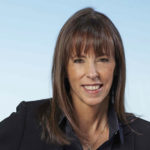Caitlin Abber is a senior editor at Women’s Health where she is in charge of the Life, Relationships, and Style verticals for WomensHealthMag.com. Caitlin is spearheading Women’s Health’s new podcast, Uninterrupted. I met Caitlin after hearing her speak at a panel at The Lady Project Summit. I’m so glad that I get to share her advice with you today.

What is a day as Caitlin like? Please walk me through a day!
My days really vary depending on if I’m doing an interview or heading to the studio. If it’s a studio-free day, I can usually be found at my desk at Women’s Health, editing and writing stories and doing all the behind the scenes work on our podcast.
I recently decided I’d only make plans one night during the week. I like being home with my husband and our dog and two cats, so I privilege that over drinks. It grounds me and allows me to save energy and money — plus I can’t work with a hangover, so this is a foolproof way to avoid that! I do try to schedule one to two coffees a week with someone I want to meet or a friend I need to catch up with. That mixes it up, and I find it’s more productive than happy hours or expensive dinners in the city.
What are your responsibilities as senior editor at Women’s Health?
I’m in charge of the Life, Relationships, and Style verticals for WomensHealthMag.com, so that’s everything from abortion rights to Wedgie Jeans. I work with writers to develop pitches, edit their drafts, and build and style stories in our content management system (CMS). I also generate ideas for how we’re going to tackle current events and collaborate with the editors of our other verticals to make sure our content is current, smart, and cool.
Our podcast, Uninterrupted, is my baby, and I spent a lot of time finding and scheduling guests, writing scripts, building related social content and, of course, hosting the show and conducting the interviews.
What do you like most about working at Women’s Health?
I love working with really smart women. I love being able to come up with an idea and feel empowered to make it happen. I like seeing our audience grow and respond to our work. And my absolute favorite part is finding and helping other women share their own stories— whether they’re my colleagues, writers, or women who need to have their voices amplified.
You are the host of Women’s Health’s new podcast, Uninterrupted. What do you love about hosting the podcast?
The podcast is just so fun. I love meeting all of our guests and having that intimate experience of being in the recording studio with them and forgetting our mics are on.
What qualities do you look for when you are hiring someone?
I look for hunger and bravery — someone who isn’t afraid to raise her hand and say she has an idea and wants to be the one to execute it. I also look for empathy — someone who seems kind and open to finding new ways to understand people and their stories.
What is your favorite thing about working in journalism?
There’s definitely an immediate satisfaction of being able to point to something you wrote and say, “I made that happen with my brain.” And if other people relate to it, or share it, or even if they hate it, that’s rewarding too.
What are the most important characteristics someone needs to have to be successful in your role?
Something I’ve learned is that you need to be good at, as the phrase goes, killing your darlings. Not all ideas are worth the effort it takes to get them on the page. To that end, you need to be able to handle criticism, and not let it crush you when something you worked really hard on doesn’t get the attention you think it deserves. And then you need to be able to come in the next day with a new idea you’re really excited about.
What has been the proudest moment from your career so far?
The proudest moment in my career was knowing that my boss and colleagues at Women’s Health believed in me enough to let me run with the podcast. It meant shifting around some of my other responsibilities, but everyone was excited about the idea and thought I could do it, and that meant so much to me.
What is your favorite piece that you’ve published?
I love everything we do at Women’s Health around abortion. My friend Renee Bracey Sherman is an incredible abortion rights activist, and she has been so generous with sharing her story with us. I am excited everytime I get to add her byline to our site.
What is your advice for someone who hopes to work at Women’s Health or a similar publication?
Content that is made for women is changing so much. At Women’s Health we banned the term bikini body, and all of our sex content is positive and affirming in a way that is so modern. I think if you want to work at Women’s Health or a similar publication, you need to start thinkin
But on a very granular, practical level, you should learn how to use Photoshop, be active on social media, get comfortable expressing your views, and read the type of stories you want to write. You don’t need to go to journalism school (I never did), but you do need to know how to write a 700 word story in an hour and a half or less.
You manage a team of freelance writers. What advice do you have for someone who hopes to write freelance articles for Women’s Health?
Read Women’s Health! If you pitch me something we covered last week, that’s going to look really lazy. Come at me with your fresh, intersectional ideas that reflect the lives of women in 2016 (and meet your deadlines!) and we will be in good shape.
I am open to hearing pitches from anyone, so feel free to always reach out: caitlin.abber@rodale.com.
You were the issues beat lead for MTV. What were your responsibilities there?
My responsibilities at MTV were pretty similar to what they are at Women’s Health. I worked with freelance writers, generated ideas for pitches and long-term projects, and found ways to have a dialogue with our audience about political and social issues that mattered to them.
What is one thing that you wish you had known when you were starting out your career?
What the Internet is now and the jobs that are available to recent grads was not a thing ten years ago when I graduated. So I wish I knew this was possible!
Beyond that, I wish I knew that reaching out to people I want to work with isn’t embarrassing, it’s brave and productive.
What is on your desk right now?
A First Aid Beauty lip balm, water, coffee with steamed almond milk, and some fancy tampons a company sent me.
What are you reading right now?
I’m reading an advance copy of Sara Benincasa’s “Real Artists Have Day Jobs.” I’m only halfway through, but I love it. Sara is simultaneously incredibly kind and career driven —which is not something we prioritize as a culture, but I think as more women gain power, that will definitely change. I am interviewing Sara for Uninterrupted and I can’t wait to talk to her about that.
What is your morning routine?
I want to tell you that I hacked the ‘morning routine’ trend years ago by investing in a coffee maker that runs on a timer. It’s a life changer. Mine starts brewing at 6 am, but I generally check emails and the news from bed until around 7 am. I love getting ready in the morning — hair, makeup, clothes— the whole thing. I listen to a podcast or music and eat cereal while I’m primping. Doing it all up makes me feel important and professional.
What is the best advice you’ve ever received?
The best advice is a slogan we all know really well. Just do it. Stop talking about it and make it happen.
What is your career advice for other young professional women?
I could write so much about this, but I’ll limit it to five things:
-
Take care of yourself first. Make sure you’re getting 7-8 hours of sleep a night. Anyone who tells you that isn’t possible or prioritizes the bottom line over your health isn’t someone you want to work for.
-
Don’t apologize for being a woman and don’t think you have to be like your male coworkers in order to keep up. If their jokes are sexist or just not funny, don’t laugh.
-
Keep notes. Write down how you’re feeling, things you heard or things that were said to you, moments you felt empowered, opportunities you seized or let pass. All of this will be valuable to you some day.
-
There’s two women you should connect with at every job: one woman you look up to, and one woman who looks up to you.
-
Skip as many happy hours as you can.
Read Caitlin Abber’s Women’s Health articles, listen to Uninterrupted, and follow along on Twitter and Instagram.
































26 Responses to Career Profile: Caitlin Abber, Women’s Health